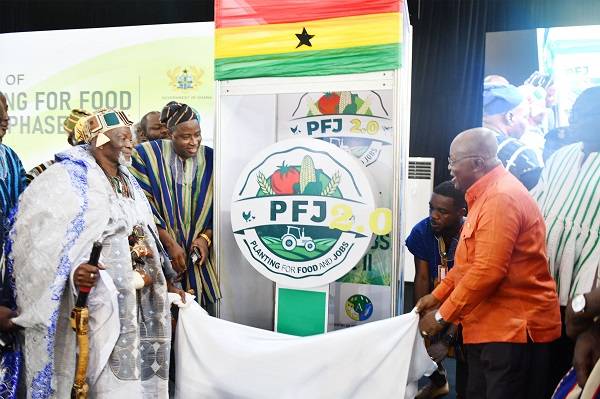
President Nana Addo Dankwa Akufo-Addo on Monday launched phase two of the Planting for Food and Jobs (PFJ 2.0) in Tamale, the Northern Regional Capital.
Aimed at providing affordable and timely credit designed to meet the needs of farmers’ needs, the phase two of the PFJ, also known as input credit system, will replace the input subsidy under the first phase.
It is based on four main principles namely; value chain driven, market-driven, private sector focus and promoting inclusivity.
Targeting about 1.2 million farmers across the country, the phase two will focus on grains such as maize, rice, soyabeans, and sorghum, roots and tubers such as yam, vegetables, and poultry such as broiler production and processing.
The phase two further seeks to also improve access to agricultural inputs, foster the adoption of modern farming practices and technologies, and catapult the agricultural sector to new heights.
Launching the initiative, President Akufo-Addo said the PFJ was in line with government’s unwavering commitment to the growth and prosperity of farming communities.
He said the initial phase, which was launched in 2017, was to promote food security, immediate availability of selected food crops on the market, and also to provide jobs for Ghanaians.
He explained that, the PFJ 2.0 would consolidate gains in the agriculture sector of these country so far made under the phase one of the PFJ.
He said the first phase benefited more than 2.7 million farmers and other agriculture value chain actors across the country.
This, President Akufo-Addo noted was under the five broad modules – food crops; tree crops, also known as the Planting for Export and Rural Development (PERD), horticulture, livestock sector, known as Rearing for Food and Jobs and; mechanisation.
He added that there was a relatively stable food security environment with food self-sufficiency in major food staples such as maize, cassava, and yam under the modules.
The President said the PFJ resulted in an increase of agricultural sector growth rate, from 2.7 per cent in 2016 to an average of 6.3 per cent from 2017 to 2021, and an improvement of nearly 50 per cent in rice self-sufficiency in 2022, from 29.1 per cent in 2016 under the first phase of the PFJ.
Also, increased fertiliser application rate from 8 kg/ha in 2016 to 25 kg/ha in 2022; increased distribution of certified seeds from 2,000 MT in 2016 to 36,000 MT in 2022 as well as improved private sector investment in the seed industry were achieved under the programme.
This according to him, also enhanced extension service delivery with the recruitment of 2,700 AEAs in 2018.
He added that the successes of the PFJ Phase one encountered some limitations including heavy financial burden on the government imposed by subsidies on seeds and fertilisers; limited adoption of the value chain approach; limited access to agricultural credit; low prioritisation of national strategic stock; ineffective monitoring of input suppliers and distributors and; targeting of only smallholder farmers.
The Minister of Food and Agriculture, Dr Bryan Acheampong said the phase two of project required land availability and called on the chiefs in the country to make lands available for farmers to venture into the programme.
The Overlord of Dagbon, Ya- Na Abukari Mahama assured the government of the readiness of traditional authorities to release lands for potential farmers to cultivate under the programme.
FROM YAHAYA NUHU NADAA, TAMALE







